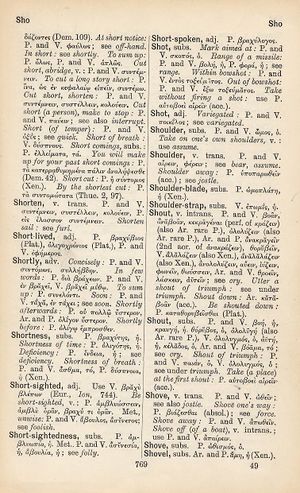shout: Difference between revisions
Λυποῦντα λύπει, καὶ φιλοῦνθ' ὑπερφίλει → Illata mala repende; amantem magis ama → Den kränke, der dich kränkt, und liebe den, der liebt
(CSV5) |
m (Woodhouse1 replacement) |
||
| Line 1: | Line 1: | ||
{{Woodhouse1 | {{Woodhouse1 | ||
|Text=[[File:woodhouse_769.jpg|thumb|link={{filepath:woodhouse_769.jpg}}]] | |Text=[[File:woodhouse_769.jpg|thumb|link={{filepath:woodhouse_769.jpg}}]] | ||
===verb intransitive=== | |||
P. and V. βοᾶν, ἀναβοᾶν, κεκραγέναι (perf. of κράζειν) (also Ar. rare P.), ὀλολύζειν (also Ar. rare P.), Ar. and P. ἀνακραγεῖν (2nd aor. of ἀνακράζειν), θορυβεῖν, V. ἀλαλάζειν (also Xen.), ἀναλαλάζειν (also Xen.), ἀνολολύζειν, αὔειν, ἰύζειν, φωνεῖν, θωύσσειν, Ar. and V. θροεῖν, λάσκειν, ἀυτεῖν; see [[cry]]. | [[prose|P.]] and [[verse|V.]] [[βοᾶν]], [[ἀναβοᾶν]], [[κεκραγέναι]] (perf. of [[κράζειν]]) (also [[Aristophanes|Ar.]] rare [[prose|P.]]), [[ὀλολύζειν]] (also [[Aristophanes|Ar.]] rare [[prose|P.]]), [[Aristophanes|Ar.]] and [[prose|P.]] [[ἀνακραγεῖν]] (2nd aor. of [[ἀνακράζειν]]), [[θορυβεῖν]], [[verse|V.]] [[ἀλαλάζειν]] (also [[Xenophon|Xen.]]), [[ἀναλαλάζειν]] (also [[Xenophon|Xen.]]), [[ἀνολολύζειν]], [[αὔειν]], [[ἰύζειν]], [[φωνεῖν]], [[θωύσσειν]], [[Aristophanes|Ar.]] and [[verse|V.]] [[θροεῖν]], [[λάσκειν]], [[ἀυτεῖν]]; see [[cry]]. | ||
[[utter a shout of triumph]]: see under [[triumph]]. | |||
[[shout down]]: [[Aristophanes|Ar.]] [[καταβοᾶν]] (acc.). | |||
[[be shouted down]]: [[prose|P.]] [[καταθορυβεῖσθαι]] ([[Plato]]). | |||
===substantive=== | |||
P. and V. βοή, ἡ, [[κραυγή]], ἡ. [[θόρυβος]], ὁ, [[ὀλολυγή]] (also Ar. rare P.), V. [[ὀλολυγμός]], ὁ, ἀυτή, ἡ, [[κέλαδος]], ὁ, Ar. and V. [[βόαμα]], τό; see [[cry]]. | [[prose|P.]] and [[verse|V.]] [[βοή]], ἡ, [[κραυγή]], ἡ. [[θόρυβος]], ὁ, [[ὀλολυγή]] (also [[Aristophanes|Ar.]] rare [[prose|P.]]), [[verse|V.]] [[ὀλολυγμός]], ὁ, [[ἀυτή]], ἡ, [[κέλαδος]], ὁ, [[Aristophanes|Ar.]] and [[verse|V.]] [[βόαμα]], τό; see [[cry]]. | ||
[[shout of triumph]]: [[prose|P.]] and [[verse|V.]] [[παιάν]], ὁ, [[verse|V.]] [[ὀλολυγμός]], ὁ; see under [[triumph]]. | |||
[[take]] (a [[place]]) [[at the first shout]]: [[prose|P.]] [[αὐτοβοεὶ αἱρεῖν]] (acc.). | |||
}} | }} | ||
Revision as of 08:50, 20 May 2020
English > Greek (Woodhouse)
verb intransitive
P. and V. βοᾶν, ἀναβοᾶν, κεκραγέναι (perf. of κράζειν) (also Ar. rare P.), ὀλολύζειν (also Ar. rare P.), Ar. and P. ἀνακραγεῖν (2nd aor. of ἀνακράζειν), θορυβεῖν, V. ἀλαλάζειν (also Xen.), ἀναλαλάζειν (also Xen.), ἀνολολύζειν, αὔειν, ἰύζειν, φωνεῖν, θωύσσειν, Ar. and V. θροεῖν, λάσκειν, ἀυτεῖν; see cry.
utter a shout of triumph: see under triumph.
shout down: Ar. καταβοᾶν (acc.).
be shouted down: P. καταθορυβεῖσθαι (Plato).
substantive
P. and V. βοή, ἡ, κραυγή, ἡ. θόρυβος, ὁ, ὀλολυγή (also Ar. rare P.), V. ὀλολυγμός, ὁ, ἀυτή, ἡ, κέλαδος, ὁ, Ar. and V. βόαμα, τό; see cry.
shout of triumph: P. and V. παιάν, ὁ, V. ὀλολυγμός, ὁ; see under triumph.
take (a place) at the first shout: P. αὐτοβοεὶ αἱρεῖν (acc.).

